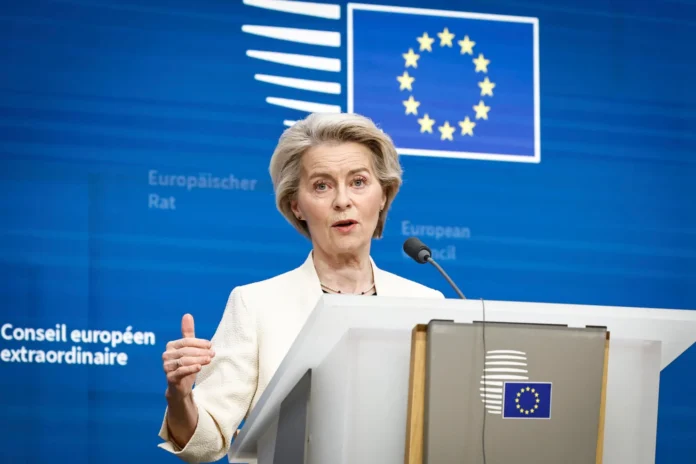The European Commission has announced its most significant move yet in response to the ongoing Gaza war, proposing the suspension of Israel’s preferential trade benefits and the introduction of targeted sanctions. If approved, the plan would place an additional €227 million in annual tariffs on Israeli goods exported to the European Union.
The decision, presented Wednesday, signals the EU’s toughest stance toward Israel since the start of the 23-month conflict. The proposal would end preferential treatment for roughly 37% of Israeli exports to the EU, a major economic blow since the bloc remains Israel’s largest trading partner, accounting for 32% of its global trade.
Commission Targets Human Rights Violations

European Commission President Ursula von der Leyen emphasized that the measures are a direct response to what Brussels sees as violations of the EU-Israel Association Agreement, which requires both sides to uphold human rights.
“The appalling events taking place in Gaza on a daily basis must stop,” von der Leyen stated during her State of the Union address. She called for an immediate ceasefire, full humanitarian access, and the release of all hostages held by Hamas.
EU foreign policy chief Kaja Kallas outlined the comprehensive package, which includes sanctions not only against Israeli officials but also against ten senior Hamas leaders and a group of violent Israeli settlers. The targeted Israeli officials include National Security Minister Itamar Ben-Gvir and Finance Minister Bezalel Smotrich, both described by the Commission as “extremist ministers.”
The suspension would primarily impact agricultural products, such as fruits, vegetables, and nuts, reducing Israel’s competitive edge in the European market.
Sanctions Package Includes Funding Cuts
Alongside trade restrictions, the Commission announced it would freeze €32 million in bilateral funding for Israeli government projects. However, Brussels stressed that support for Israeli civil society organizations and the Yad Vashem Holocaust memorial would continue.
This dual approach, the Commission said, aims to pressure the Israeli government while avoiding harm to cultural and humanitarian cooperation.
Political Hurdles Could Block Approval
For the measures to take effect, they must secure qualified majority support from EU member states — at least 15 of the 27 countries representing 65% of the EU’s population.
Diplomatic sources suggest the plan faces an uphill battle. Several countries, including Hungary, the Czech Republic, Austria, and Bulgaria, are expected to oppose the proposal. More crucially, Germany and Italy, whose combined support could guarantee passage, have not yet committed.
A spokesperson for the German government confirmed that Berlin has not reached a final decision. EU officials acknowledged that the political divide remains strong but pointed to shifting public opinion across Europe as a possible driver of change.
Israeli Government Condemns EU Proposal
Israel reacted strongly to the Commission’s announcement. Foreign Minister Gideon Saar sent a letter to von der Leyen, warning that sanctions would not deter Israeli actions and accusing the EU of “empowering Hamas.”
“Europe harming Israel while there is an attempt to annihilate the surviving remnant of the Jewish people and its only state marks the trampling of every moral standard,” Saar wrote, calling the EU’s accusations legally flawed and politically biased.
Humanitarian Toll of the Gaza War
The conflict, which began on October 7, 2023, after a Hamas attack killed around 1,200 Israelis, has exacted a staggering humanitarian cost. According to the Gaza Health Ministry, over 65,000 Palestinians have been killed, with more than 200,000 wounded — roughly 10% of Gaza’s population.
Despite repeated international calls for de-escalation, Israeli military operations continue, with reports of widespread destruction and severe shortages of humanitarian aid entering the territory.
What Comes Next
The European Council is expected to debate the proposal in the coming weeks. If passed, the decision would mark a historic turning point in EU-Israel relations, signaling that Brussels is willing to use trade leverage to influence the course of the conflict.
Analysts say the move could significantly escalate diplomatic tensions between Israel and Europe, while potentially pressuring Tel Aviv to reconsider its military strategy. The outcome will largely depend on whether major EU players like Germany and Italy decide to back the plan.
Sources: BBC


